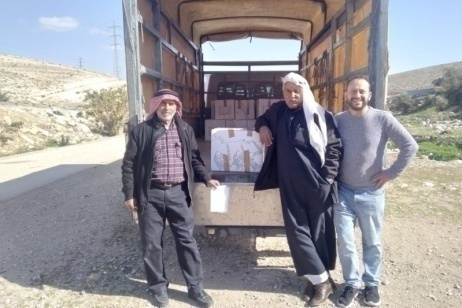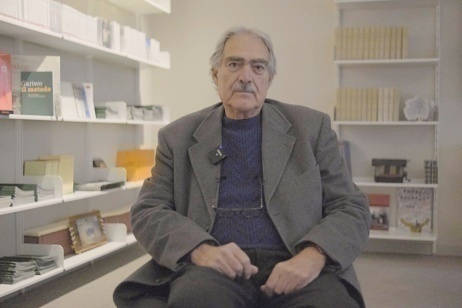Interviewed by Gariwo, Meduza's CEO Galina Timchenko explains that it is thanks to a sort of "active pessimism" that she is able to carry on her work at the magazine, nowadays the only major surviving dissident voice in the Russian media landscape. "I prefer to be a pessimist. Many think that pessimists are passive people. But they are not. My pessimism allows me to see all the risks around the difficult path that my team is going through. As a result, I can think to new strategies to continue to tell what's happening."
Before being the executive director of Meduza, Galina Timchenko was the editor in chief of the Russian magazine Lenta.ru until 2014's Russian invasion of Donbass, when she was fired by her publisher and replaced by a journalist directly chosen by the Kremlin. During her speech at the Garden of the Righteous in Milan, where she was invited to join a ceremony for the World Press Freedom Day, she explained that - as her mother was Ukrainian - "by denying the existence of Ukraine, Mr. Putin is denying at least half of who I am."
Along with 39 former colleagues at Lenta.ru, she founded Meduza in Latvia "because it was the cheapest place, away from the grip of the Kremlin, where to found a newspaper." For years Meduza has been a news and aggregator and a content producer who has put at the center of his work a special attention to sources and verification. However all the editorial strategies were totally undermined on April 23, 2021, when the Moscow Ministry of Justice added Meduza to the list of foreign agents.
Thanks to an effective crowdfunding campaign, supported by thousands of Russian readers, Meduza managed to survive, preferring to cut the salaries of the top management instead of firing journalists. On March 4, the Kremlin definitively blocked access to the site, which in the meantime had become a precious bulletin, updated 24 hours a day on the invasion of Ukraine through news, podcasts and stories from the field.
In Russia, Meduza can reach only those readers who rely on VPNs, virtual private networks, to bypass censorship. "We have had an explosion of readers from Australia, New Zealand and other countries. From Iceland we had a number of readers greater than the number of the inhabitants of the island themselves: obviously they are Russians 'in disguise'".
When at the Garden of the Righteous in Milan, Galina placed a flower on the stone dedicated to Andrei Dmitrievič Sakharov, the Soviet physicist whose work in favour of civil rights earned him the Nobel Peace Prize. One of Sakharov's best-known phrases is "A country which does not respect the rights of its own citizens will not respect the rights of its neighbours". With different words, this concept was stressed by Galina Timchenko several times, as repeatedly stressed the lack of attention the Russians received before the war began.
On 3 May at the Garden of the Righteous there were dozens of journalists and citizens eager to hear the point of view of Russian journalists. What impressions did you have?
Conferences about media are generally formal. Here in Milan it was a very warm ceremony but frankly I was a little bit stressed because I realised that this ceremony is actually a ceremony for the funeral of Russian press. I was at my own funeral ceremony, because there is no freedom of press in Russia! But going further of my feelings and my grief, the ceremony was very important because it seems to me that for many years, Western journalists were in a circle of magic of Putin's power. Every time I talk to my colleagues or make a speech at a conference, I say: "Guys, Russia is full of heroes. Russia is full of characters. Please do not write only about Putin. Putin is not the whole Russia. And such ceremonies are very important to see and to feel that Russia and Russian journalism is much more bigger than fighting with the regime or standing against the war. It's the most important think for understanding between Western journalists journalists and Russian journalists.
It's just important to feel ourselves and maybe to check our values. For me it's very important because actually me, and my colleagues at Meduza, feel a little bit alone, as almost all of our competitors closed or postponed their broadcasting until the war will end. We feel all alone. So it's very important to see that there are a lot of journalists, a lot of colleagues, a lot of activists who care and support you.
In Russia, Meduza is no longer reachable. Your audience resists, also thanks to a certain kind of technology that bypasses censorship. Yet this is only a small part of the population, as most of the country is informed only through the official dispaches which instead is at the mercy of official information released by the Kremlin. Do you have a strategy to reach the so-called deep Russian, that Russia that just does not inform itself or at most passively suffers what the state TV is on?
It is a very difficult question. I have to say I have stopped pursuing this goal. I usually say: “I don't know how to wake you up if you want to stay blind”. I'm interested in reaching my core audience, which is made by people who are interested in what's going on. People who care about the future of the nation. So after being blocked, we have known that we could still reach our audience and now we are focused on those people who have supported us morally, verbally, in written form or financially. I want to focus on them. I always say that our mission is to inform as many people as possible. But the current situation prevents us from reaching the audience we want. So our concrete goal is to inform a young, technical driven and socially active audience. Those who are active not just in their own lives, but also politically. People who don't just want to sit and watch what happens. People who want to act. So, this is our goal and our target audience. Unfortunately, I have no possibility to be heard by every Russian. I'm not Konstantin Ernst, the head of the first state TV channel. But I want to preserve our readers, those for whom Meduza's existence is vital for their lives.
You said that your readers are active and curious people. Yet for decades Russia has been ruled by propaganda. During this years and especially in the last three months we have seen that usually the Kremlin's is a "low quality" propaganda. Nevertheless it appears to be effective. How do you educate people to deepen the issues, to verify the sources and to question the information developed by the government?
The currency of our market is made up of time and attention. These are our currencies. So you need to understand how to capture and maintain attention through, for example, some engagement tricks like news gaming or political quests or some very short formats that cover the whole picture in a very short form. We could not push people to read big texts, but at first you can show them that news are cool, that there are a lot of news formats they could be interested in, that news "is the new orange".
For example, when this corona outbreak started, we decided that one of our platforms, Instagram, had to host emotional pills for our reader. Meduza itself produces and broadcasts news, profiles, interviews, reporting: everything is serious, although a little bit sarcastic. But people do need a warm feeling and we started to publish - on Instagram - good news, human touch news, some very cordial tests. We found some Instagram accounts with similar content and we promoted it. In this way we managed to create a very warm hearted community. They believed in us and they feel safe in our Instagram account.
So, despite of the fact that Instagram is a closed social network, we have had very good conversions from Instagram to our website and our application. They believed in us. They feel this emotional connection with us and they realised that this is a safe and very warm-hearted place.
Let's go back to the war. Is Putin's strategy to force media not to name things by their own name working good?
It seems to me that it works. When censorship was imposed on us in these times of war, a WhatsApp group of journalists that I belong to started discussing the situation and most of the directors said: "Friends, we don't want to be fined or persecuted. . Let's call it a 'special operation', we are too worried about the risks ... "And so on. The sense of this censorship is not only linked to the non-use of that word, but to the sense of fear that prevents you from freely expressing your emotions, your thoughts. We have an absolutely absurd example that explains this complaint. You know, in the days of the Soviet Union there was a story about the man who goes to Red Square with an empty sheet of paper and is arrested. The policeman tells him: "Because your paper is blank, what does it mean"? And the man replies: "What do I have to explain? Everyone knows what's going on. A blank sheet is enough".
In the sam way, my colleagues who ara nowadays living in Russia are very afraid of doing something that is not allowed. And the main point of all these laws is to let you feel a little bit unbalanced. What should I do? What I shouldn't do? Would they punish me or not?
They are not confident in their job, in their profession and in their thoughts. I call it terror. Because the main goal of any terrorist is to spread fear. So through these war censorships, these incredibly insane fines and prison sentences, the Kremlin and Putin intend to spread this fear. This is the main point.
We want tu turn this interview in a chance to introduce Meduza to the Italian readers. As the magazine you lead is surviving through the support of your community, how can we spread your stories?
We are open to any collaboration. Three Scandinavian newspapers started publishing articles in Russian but did not know how to reach a Russian audience. And we have a lot of content and a large Russian audience. So we are now collaborating with these three Scandinavian newspapers. It's very simple. We can provide any type of content or speak as experts or any other useful action in exchange of promoting of our donation campaign (https://save.meduza.io/eu).
The Garden of the Righteous of Milan is dedicated to those who risk their lives to defend human dignity. According to you, who are the Righteous of the contemporary Russia?
I would say Navalny. A brilliant mind and, right now, the bravest man I have ever met in terms of dignity and freedom. He is in prison and was sentenced to nine years in harsh prison. Yet he jokes. He makes fun of those idiots who put him behind bars. I can't say I know him very well but we met and I had the opportunity to interview him. I have the impression that this man and his slogans are the most powerful tools we have in Russia today. “Don't feel fear”, “Don't be scared”, “Let's do something nice for the beautiful future of Russia”. So, definitely Navalny.







